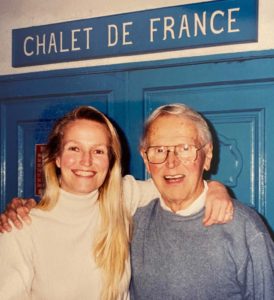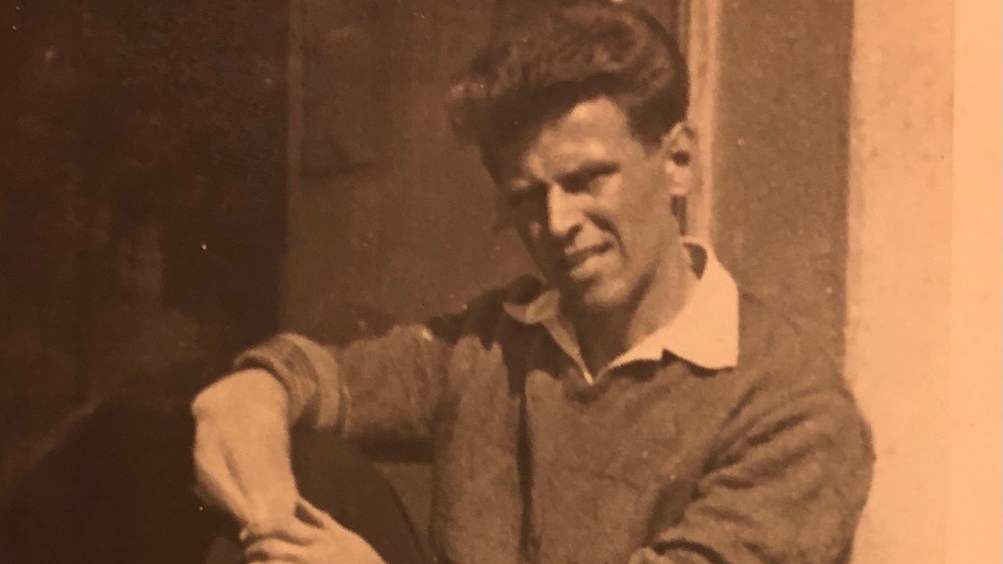Heroes fill us with admiration, touch our hearts, and change how we view the world. But heroes aren’t easily identified on the outside by red capes, masks and shields. They are normal people who are part of our everyday lives; our neighbors, family and friends.
Roger Marcel Heitz lived a wonderfully ordinary existence for most of his life in Palos Verdes Estates with his wife, Eli Myring Heitz and his children, Melinda and Daniel. His family referred to him as “a true rocket scientist” based on his thirty-six-year career as a chemist at Northrop Grumman. Roger rarely discussed his WWII wartime experience, so when his daughter, my friend, Melinda Heitz Jones, shared her father’s story with me, I was excited to learn that our sleepy community was home to a hero like Roger. I was especially intrigued because his experience parallels a book I am writing which is set during World War II.
The call today to protect our democracy is a strong reminder of the great sacrifices that have been made throughout history to protect our freedoms. When Nazi Germany occupied countries across Europe, freedom was a matter of life or death and choices were limited: fight or flight, comply or die. These were the options available to Roger Heitz.
Roger’s early years were unimaginable, marked with the heroism and tragedy that would typically be found only in a film. He was a sixteen year old French citizen living in Strasbourg, the Alsace region of northeastern France bordering Germany and Switzerland, when Germany conquered France in June of 1940. Alsace was annexed to Germany, and although Roger and his family were vehemently opposed to their new dictator, Adolph Hitler, they were subjected to a rigorous Germanization policy requiring them to follow the Führerprinzip, the laws of the Nazi Party.
Roger was one of 130,000 Alsace men who were ordered to join the German armed forces on the Eastern Front. He received his conscription on three occasions. The first time, he was an eighteen year old student in Strasbourg. When he refused, he was forced to work in a factory in Czechoslovakia to support the German military efforts.
In mid-1943, he was drafted a second time and went into hiding in the countryside, fighting with the French Resistance against the Nazis, between Alsace and Czechoslovakia. However, when the Nazis threatened to deport his family to a concentration camp, Roger turned himself in. His family doctor provided the authorities with a false appendicitis diagnosis in a failed attempt to keep him out of the military. The military insisted that Roger undergo surgery and afterward, he intentionally infected his surgical wounds to insure a prolonged hospital stay. He fled the hospital, continuing his activities with the French Resistance, but surrendered when the authorities threatened again to send his family to a concentration camp.
This was his third strike, and he was sent to a German military prison to be tried for desertion, under penalty of death. He concocted an elaborate excuse for his failure to report to duty, which amazingly, the jury believed. Upon his release from prison he was forced to enlist in the German Army. Immediately following his enlistment, he and a friend, Jean-Pierre Dietz, deserted their posts and went into hiding.
 Life in hiding was fraught with dangers, particularly when the Germans came to occupy the first floor of the Chateau d’Ittenwiller in Alsace where Roger and Jean-Pierre hid. After several months they were forced to relocate from the chateau, and took refuge in a church in Barr, France.
Life in hiding was fraught with dangers, particularly when the Germans came to occupy the first floor of the Chateau d’Ittenwiller in Alsace where Roger and Jean-Pierre hid. After several months they were forced to relocate from the chateau, and took refuge in a church in Barr, France.
They continued with their resistance activities while in hiding until the end of 1944 when Hitler used Alsace as the epicenter of his last major offensive against the Allied armies. Roger and Jean-Pierre joined a group of American soldiers to fight against the German military until December of 1944 when Roger reunited with his family in a small village near Saverne. The reunion was bittersweet; Roger’s grandmother and a sister were killed during the allied bombing of Alsace in 1944.
After the war, Roger graduated from the University of Strasbourg and received a Fulbright scholarship to pursue his PhD at the University of Colorado, Boulder. It was there where he met Eli, who resides in Palos Verdes Estates to this day. Sadly, Roger passed away in 2009.
Roger’s journey was truly incredible, especially in light of the fact that most of the 130,000 draftees from Alsace died in battle fighting with the German Army on the Eastern Front. We owe our peace and freedom to people like Roger Heitz who stood firm in the face of tyranny and risked their lives to protect the freedoms and privileges that we cherish so dearly today. The men and women who fought in WWII changed the course of history and gave us our world, and for that, we are eternally grateful.
If you would like to thank a hero who lives among us, or if you have a story about someone who touched your heart and made a difference in this world, please share it here!

Amazing story of heroism!!! Thank you for sharing Holly and Melinda!
It is amazing the heroism that Roger exhibited when he was such a young man. The conviction he showed in the face of such extreme danger was awe-inspiring. Thank you, Josie!
Holly did a great job at summarizing and capturing the events of his time during World War II. Thankful!!!
Yes, thank you for sharing. Necessity being the mother of invention, his inventive tactics to stay out of German military seem remarkable. What a destructive time in history. Great story.
Thank you, Janet. I can’t imagine a foreign government conquering our country and having to go through what Roger did to hold onto his values and retain his liberties. We must never forget this catastrophic period in our history.
I love how Holly captured his story!! 🥰
Thank you for telling Rogers story. He is our Hero and we miss him everyday.
Bob, I am sure you do. We are so lucky that Melinda knows his story so it can be passed on to younger generations!
Thank you for sharing our father’s intriguing and motivating story of bravery and heroism. Roger was a kind, gentle and unassuming man who you’d not immediately associate with such wartime accolades. Given all he faced at that time, it’s a miracle he lived such a full life. Even more impressive was the fact that he never hardened or was bitter as a result of it all. He loved his family and thoroughly enjoyed a healthy social life. Those who knew him were blessed. He truly was one of a kind…and is deeply missed.
Your father had extraordinary strength and courage and was an incredible role model. It is no wonder you and Melinda turned out to be such kind-hearted and caring individuals.
Very kind and thoughtful words, Holly. Thank you. Your creation of such a nice passage means so much to Melinda and myself. Our deepest appreciation indeed.
Thank you, Daniel!
Thank you for this inspiring story of sacrifice and heroism. We are losing our WWII heroes every day. My father was one of them. God bless Mr Heitz and all of the men and women who fought for our freedoms. We must never let their sacrifice be for nothing
Dianne, yes, a heartfelt thanks is owed to those who made the ultimate sacrifice for our freedoms in WWII and to those like Roger and your father, who returned. Thank you for reading and commenting on Roger’s story.
Yes an unbelievable time!!! Something we can’t even imagine! Thank God for their heroism!
What an amazing story! Thanks for sharing Holly!
Thanks for reading about Roger, Jodi!
Wow, A true hero what an amazing story of a determined individual !
It is amazing how unshakeable he was in his beliefs and his willingness to risk everything to uphold those beliefs!
Thank you for sharing this amazing story, honoring Roger, and keeping these important memories alive. Wonderful that your book will be doing this too—I can’t wait to read it! I love your blog and how it honors others and reminds us that everyone has a story.
Thanks Jennifer! If anyone has a story that they would like me to write about and share, please contact me. Our stories are so important to share our history, convey values and forge connections!
I so enjoyed reading this, especially since Roger’s daughter, Melinda, is an old friend. What a story of bravery and gumption that we should all strive for! Thank you for sharing these very human stories on your blog Holly and Melinda for sharing her dad’s sacrifices with all of us. Bravo!
Thank you, Rosa! A big thanks to Melinda for preserving her father’s story!
What a remarkable hero he was. It’s so important to remember and pass on these stories. Thanks to you and Melinda for sharing her fathers story.
Can’t wait to read your book holly!
Thank you, Helen!
Holly a truly amazing story. Thank you for sharing it ! This is the kind of story one sees in the theaters (before 2020).
Thank you for the inspiration!
Thanks, Kim. Roger’s experiences do seem like they belong in a film! Speaking of films, hopefully we will be back in the theaters soon!
What an amazing man. I cannot imagine how harrowing it was to be a part of the French Resistance and live every day in fear. His story would make a great novel as well. Thanks for sharing, Holly!! xo